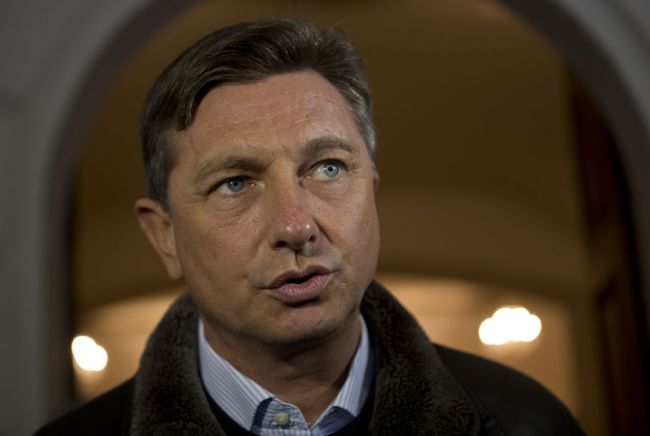 |
Slovenia`s former prime minister Borut Pahor talks to the media outside a polling station in Sempeter, Slovenia, Sunday, Dec. 2, 2012. (AP) |
Slovenia's center-left former prime minister Borut Pahor became the country's fourth president Sunday, scoring a comfortable second-round victory despite his support for the government's unpopular austerity measures.
With 99.99 percent of ballots counted, Pahor had 67.44 percent of the votes, ahead of the incumbent Danilo Turk with 32.56 percent, the central electoral commission said.
The 49-year-old Pahor, who was backed by the center-left opposition Social Democrats (SD), also received the votes of the center-right ruling parties in the second round.
He appeared to have won voters over with a populist U.S.-style campaign -- and by admitting that some of his decisions as prime minister had been wrong.
Pahor was ousted as premier by a no-confidence vote in 2011, but during his presidential campaign, he capitalized on his image as a good-looking, relaxed, people's politician.
"This victory is only the beginning of a new hope, a new time," Pahor said after exit polls earlier Sunday gave him victory. He was "overwhelmed" by the support he had received, he said.
Earlier, he had told reporters: "If I succeed, that result will send a strong message to Slovenian politicians that collaboration and unity are needed to overcome the (economic) difficulties."
Voter turnout in the second round however was 41.95 percent, the lowest ever at a presidential election since Slovenia declared independence in 1991.
Pahor became the favorite to take over the largely ceremonial presidential post after a surprise win in the first round on November 11, when he pushed Turk into second place.
Unlike Turk, he had defended the austerity measures introduced by Prime Minister Janez Jansa's centre-right government, arguing that there was no other option.
The belt-tightening is aimed at cutting the public deficit this year to 3.5 percent of GDP.
The cuts, including to public sector wages and welfare benefits, have brought thousands of protesters out into the streets in recent weeks.
The prime minister was among the first to congratulate Pahor on his win.
"During the campaign debates, he said things that were not popular but had to be said, and despite that he received such support," Jansa told journalists Sunday.
Earlier, Jansa's ruling Slovenian Democratic Party (SDS) tweeted: "This evening is marked by hopes that the new president will bring more collaboration."
At a debate last week, Pahor had called for more cooperation with the government, adding: "We should not lose any more time speculating about possible alternatives (to austerity)."
Slovenia, once seen as a star new member of the European Union, is suffering one of the deepest recessions in the eurozone. The problems with its banks have raised fears it may need a bailout.
The European Commission has predicted the country's output will shrink a painful 2.3 percent this year and 1.6 percent in 2013.
Turk had hoped to capitalize on the wave of protests against austerity measures.
"This government has been unsuccessful, it is arrogant, and it should make big changes," Turk said as he voted Sunday, urging it to "listen to protesters."
On Sunday evening however, he admitted defeat in a speech to supporters.
Clearly disappointed, he regretted the low turnout.
"I failed to convince more citizens to cast their votes and to give me their support," he said.
Turk, long a thorn in the side of the government, ran as an independent candidate, but with backing from the largest centre-left opposition party, Positive Slovenija (PS).
Although Slovenia's president has little power, analysts say the prime minister will benefit from collaborating with the head of state.
This could be particularly important if the opposition and unions succeed in calling referendums to try to block new reforms.
Those reforms include a controversial IMF-backed plan to create a "bad bank", a financial institution that would take over risky debt held by state-owned banks to restore trust in their balance sheets.
A week after the first-round vote, 30,000 people attended a rally in Ljubljana called by Slovenia's main unions to protest at austerity cuts, and several other demonstrations have followed.
On Friday, police in Ljubljana used tear gas and water cannon against demonstrators, detaining more than 30 people after violence erupted at the end of a largely peaceful rally.
Some 1.7 million were eligible to vote on Sunday. (AFP)








